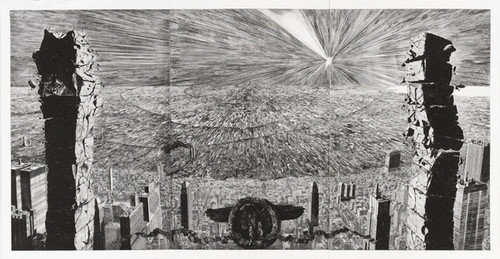Dennis Rudolph
dal 23/10/2008 al 21/11/2008
Segnalato da
23/10/2008
Dennis Rudolph
Galerie Jette Rudolph, Berlin
The Holy War, Part II: Innermost Circle (Necessity). Four portraits form the heart of the exhibition: these paintings are part of a serie of alltogether 19 portraits which are based on found photographies of anonymous German soldiers and intellectuals of the generation of the 30ties and 40ties.

Dennis Rudolph is an emerging German artist (*1979 in Berlin, based in
Berlin) presenting his third soloshow “The Holy War, Part II: Innermost
Circle (Necessity)” at the Gallery Jette Rudolph which is regarding its
content the prosecution of his show “ The Holy War, Chapter I: The
Sacrifice of the Youth” at Perry Rubenstein New York in April 2008.
Four portraits form the heart of the exhibition: these paintings are part
of a serie of alltogether 19 portraits which are based on found
photographies of anonymous German soldiers and intellectuals of the
generation of the 30ties and 40ties. By use of grisaille-technique, they
are modelled larger-than-life and appear like pathetically superelevated
representations of a fictious “Gallery of German ancestral portraits”. The
spirit of fanaticism of their era counterturns from their striking
physiognomies, from their resolute, egotistic or deranged gaze. But vainly
we look for the well- known badges on their collars: the emblem of their
ideology is missing while the names in the work titles are taken from
history, art and mythology. Hereby the national socialist content of
belief of the “ancestors” is shifted off the recipient’s focus whilst
their mimic expression precipitates into the formal marrow of an
indefinite “ideal intentness”:
Consequently the striking heads become icons of a non specified
denomination. Dennis Rudolph’s typical strategy is the precarious
transformation as per description of the portraits above as well as his
operation with cultural historically extremely overloaded “explosive
material”.
The artist’s altercation with the cultural heritage is also reflected in
the formale references within his work: on this note Rudolph refreshes
oldmaster-like techniques like painting on panels, etching and linoprint
whilst re-interpreting in a contemporary context the historic genres of
portrait, ceiling- or landscape painting. The exhibition presents a recent
largescaled painting entitled “Fall” which is part of a quadrinomial serie
with the headtitle “Eternal Ice: The Four Seasons” referring to romantic
landscape allegories we know from C.D.Friedrich: the landscape becomes the
medium for a deeper sense- making which allows to decrypt it
emblematically. The structure of the seasons is based on cycles referring
to periods of life and eras but the framed linocut “Aurora” which is
installed above the painting corresponds to the cosmic course of the
luminaries. Herein Rudolph’s semiotic vocabulary alike the dead horse, the
eternal ice, thewar grave, the column and the eagle as an heraldic animal
culminate in abstract archaic symbols like the circle and the triangle.
These symbols of a cultural historic connotation are transferred into a
more universal significance described in a large- scaled ceiling painting
of Baroque Christian tradition: disposed of the subject of Christian
salvific history and its Heavenly Hosts a transcendental, illusionistic
space opens up above our heads.
The works of Rudolph are characterized by such blank spaces: we find
neither the Christian cross nor the swastika. The symbolic charging of the
citated allegories and symbols is kept open because all the determinated
emblems of faith are from the artist’s pictographic language. Following
Jean- Francois Lyotard’s proclamation of the “End of the grand Narrations”
and the irrecovable entry into the Postmodernism Rudolph´s work articulate
the reversal of the possibility of an embedding into a political, social
or religious system. His empty, stormy clouded heaven is the ultimative
allegory of this reversal and its overcoming by art.
Opening oct 24, 2008
Galerie Jette Rudolph
Zimmerstrasse 90-91- Berlin
open: Tues- Sat 11.30 am- 6 pm
free admission



